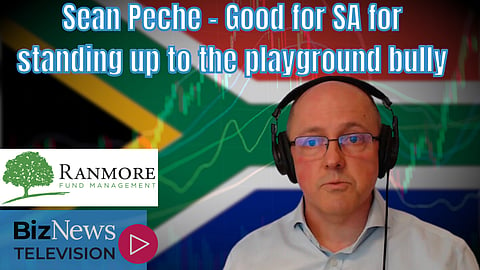Sean Peche – Good for SA for standing up to the playground bully
UK-based Ranmore funds founder Sean Peche takes a contrarian approach to the 'Black Swan' event threatening the South African economy, applauding the country for holding the line against US President Donald Trump. Likening Trump to former SA President Jacob Zuma, he predicts nothing but misery for Americans as a result of the US's aggressive actions – and has positioned the Ranmore portfolios to reflect this. He spoke to BizNews editor Alec Hogg
Sign up for your early morning brew of the BizNews Insider to keep you up to speed with the content that matters. The newsletter will land in your inbox at 5:30am weekdays. Register here.
The seventh BizNews Conference, BNC#7, is to be held in Hermanus from March 11 to 13, 2025. The 2025 BizNews Conference is designed to provide an excellent opportunity for members of the BizNews community to interact directly with the keynote speakers, old (and new) friends from previous BNC events – and to interact with members of the BizNews team. Register for BNC#7 here.
If you prefer WhatsApp for updates, sign up to the BizNews channel here.
Watch here
Listen here
BizNews Reporter
The concept of a "Black Swan" event, as introduced by Nassim Taleb, describes an unforeseen occurrence that, in hindsight, appears obvious. These events, often characterized by their unpredictability and significant impact, have shaped global history, with examples ranging from 9/11 to the COVID-19 pandemic. Recently, South Africa has found itself at the centre of such an event, as unexpected geopolitical developments threaten to alter its economic landscape.
During a recent discussion with BizNews founder Alec Hogg, Sean Peche, Chief Investment Officer at Ranmore Funds, delved into the ramifications of this latest Black Swan moment. With South Africa's economy already fragile, the nation now faces increasing uncertainty due to external pressures, particularly from the United States under Donald Trump's influence.
The latest geopolitical flashpoint emerged when the South African government decided to move forward with an International Court of Justice (ICJ) trial, a move perceived as defiant by the US administration. Trump's response was characteristically aggressive, escalating tensions between the two nations and prompting questions about the economic consequences for South Africa. Given that regulations limit South African investors to holding only 45% of their portfolios offshore, the impact of such international developments is profound.
Peche, while no supporter of Trump, drew striking parallels between the former US president and South Africa's own Jacob Zuma. Both figures, he noted, have displayed populist tendencies, been accused of undermining democratic institutions, and courted controversy through their actions. He argued that just as Zuma's leadership damaged South Africa, Trump's return to power could have a similarly destabilizing effect on the US and global markets.
The economic implications of Trump's unpredictability are already apparent. Despite his proclaimed pro-business stance, markets have shown a preference for diversification. While the US's S&P 500 has seen modest gains of 3% this year, Brazil's market has surged by 13%, and European indices have similarly outperformed. Investors appear to be shifting their focus away from the US, reflecting a growing discomfort with its political and economic stability.
Alec Hogg, pointing to historical parallels, raised concerns that South Africa could face economic isolation similar to the fallout from the infamous 1985 Rubicon speech, which triggered a collapse in investor confidence. Peche acknowledged the risks but argued that standing up to geopolitical "bullies" is sometimes necessary. He cited Canada's shifting trade policies as an example of how nations are increasingly seeking alternatives to US economic influence. Companies and CEOs, including those at major US firms like Ford, are also pushing back against rising uncertainty.
Despite these challenges, South African stocks have remained relatively resilient. Hogg questioned whether Peche's focus on global markets was indicative of a lack of financial exposure to South Africa, but Peche was quick to clarify that he has both family and clients in the country. While his firm's direct investments in South African equities are limited, he maintains a keen interest in the nation's economic future.
Looking ahead, Peche emphasized the importance of adaptability. He argued that South Africans should stand against policies that threaten economic stability, such as race-based regulations and property expropriation. However, he also cautioned against overreaction, noting that foreign investment in South Africa today is much lower than it was in the 1980s. This could mean that, while economic turbulence is possible, a full-scale crisis similar to the past is less likely.
For investors, the lesson from this Black Swan event is clear: diversification remains key. Peche highlighted opportunities in overlooked markets, such as Brazil and Europe, as well as undervalued small- and mid-cap stocks. With passive investing having funnelled capital into large multinational firms, smaller domestic-focused companies may present more attractive prospects.
In an era of mounting global uncertainty, Peche's insights serve as a reminder that while Black Swan events can disrupt markets, they also create opportunities for those who remain vigilant and adaptable. Whether South Africa can navigate these choppy waters remains to be seen, but for investors, a well-considered global strategy is more crucial than ever.
Read also:

